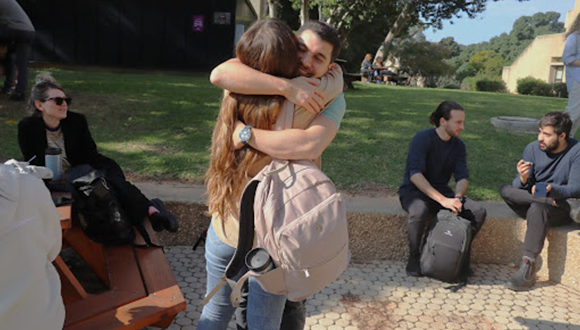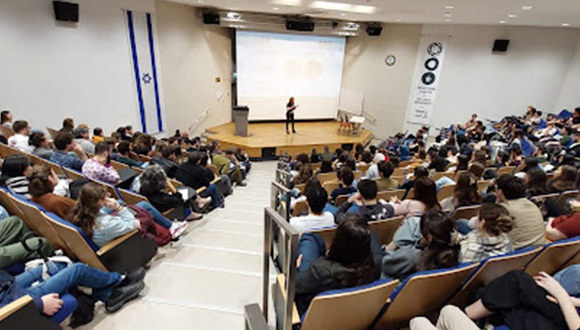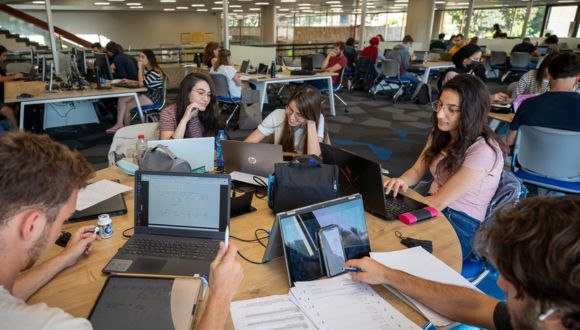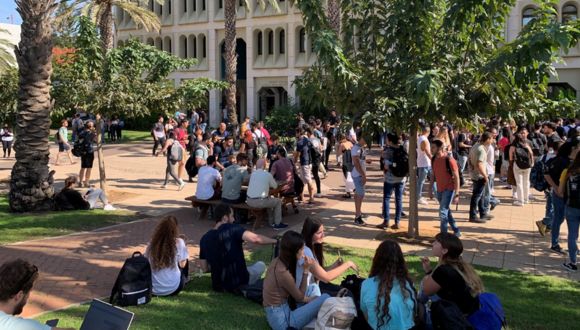
TAU’s Academic Term Officially Begins
After Waiting Months, Students Share Their Experiences of Being Back on Campus.
On December 31, 2023, while many around the world celebrated the close of a year, Tel Aviv University (TAU) marked a new beginning, albeit one that was originally supposed to occur two and a half months before on October 15: the official start of the academic term (for those not in international programs). Classrooms filled up, campus coffee shops were full of chatter, and TAU’s green lawns once again welcomed scores of friends taking in the sunshine between classes.
In many ways, the campus is back to normal. And yet, posters advocating for the return of hostages still hang prominently; many of TAU’s reserve students have not yet fully returned to class; and a shadow is cast by October 7 and the Israel-Hamas war.

Nevertheless, for those students who have returned, there is something they can all agree on: having classes to go to again, being with their peers again, is something for which they are entirely grateful.
“People are really excited to see one another and have a bit of a normal life.” — third-year political science and gender studies student Noa Ilona Joffe.
“We’re all trying to see the positive of it, to feel something positive again after a long time,” says Joffe.
Finding Connection After October 7
Joffe, who is a recent immigrant to Israel from Germany, was in South America when October 7 happened, as she had been volunteering in Guatemala with AMRIS, an organization that supports local Indigenous women. When her flight back to Israel on October 12 was canceled, she decided she would stay on in South America and continue volunteering at a hostel.
For those students not in the military reserves, Joffe says the months before the academic term have mainly been a waiting period, with most people trying to volunteer or fill up their time in other ways. And that, in some ways, the return to campus feels like the return after COVID-19 lockdowns.

For instance, while classes are currently offered in a hybrid format and can be watched online, Joffe notes that attending in person at TAU is far more popular.
“If you have the possibility to come to class, you come to class. Everyone is extra engaged and really wants to have that connection.”
She also says her instructors have been very accommodating: “They are all wanting to know what we want and trying to adjust everything to us and how we emotionally feel.”
Nevertheless, she does at times find class difficult, especially given that she is majoring in political science. “I have a class called ‘Morality and Terror’ and while there are lots of topics to discuss, it always comes back to October 7,” she shares. “Because it is still very fresh and very emotional, it is sometimes a little bit hard to be analyzing from an academic point of view.”

Joffe emphasizes that every Israeli has been impacted significantly by October 7; for her, a girl in her program was murdered and she had two family friends taken hostage (they have since been released).
Yet, despite difficult emotions, Joffe emphasizes that being back in university is the right move for her: “I’m a new immigrant and everyone I know in Israel is from university,” she says. “I don’t know what I would do in Israel without university right now, so I’m very happy it started again.”
A New Start for International Students
International student Ma Zengyu is also excited to finally be on campus at TAU.
Zengyu received her offer from the university one week before October 7 to begin a PhD track with TAU’s Department of East Asian Studies. Once she got her visa, she kept waiting until she could book her ticket from China to Israel to begin her studies.

She arrived on December 28 and said she’s been enjoying classes since the start of the term and is focused on setting up her life here. “I’m just trying to make some connections with my new friends, new classmates,” she said.
Zengyu also previously completed her MA in Ancient Israel Studies at TAU and admits that she does feel like the atmosphere has changed a bit since then; however, her biggest impression is that most people at the university are trying to get a bit of normalcy back.
“Everyone is trying to focus on what they’re doing right now and trying to get everything back on track.”
“I think they are doing all the right things to make sure they can keep going,” — says Zengyu.
From the Reserves to the Classroom
At the same time, many TAU students who are or have been in the military reserves are still very much in a period of transition; while some have returned to campus, more are expected to return in the coming weeks.
And for some reserve students, such as Ido Gazit, the feeling of being in transition is especially strong. Gazit, who is a double major at TAU in engineering and the humanities, should have graduated by now; he completed his courses last term and was working with a group to submit their final engineering project on October 15.

However, he got called up for duty the evening of October 7 and had to report to a base in the south of Israel the next morning.
“I’m stuck in my third year,” says Gazit. While Gazit continues to work full-time in the military, he was recently restationed somewhere in central Israel and at that point, he approached his commander and got special permission to take a German course through TAU.
“I wanted to do something that made me feel like a person and not a soldier.”
“It makes me feel good – like a student again,” says Gazit, who has taken two German language courses at TAU previously. “And I think it’s something good for me after three months of only doing things for the country.”
Concurrently, Gazit is also working to finally defend his project. “It’s already not that fresh in my brain – I had to read everything again and I don’t want to drag it to next year.”
While Gazit knows he will not be able to leave his position in the reserves yet, he has asked his commander if his current language-class arrangement could be made permanent. And he is thinking about what his next steps could be after his military service and is seriously considering graduate school.
“If I’m going to do it in engineering, I’d do a master’s in electrical engineering; if I do it in humanities, it would probably be something in history,” says Gazit. “However, I also might take some time to work or maybe just be a citizen for a while.
Related posts







One in Three Arab Israelis Prefer External Governance for Gaza Post-War


